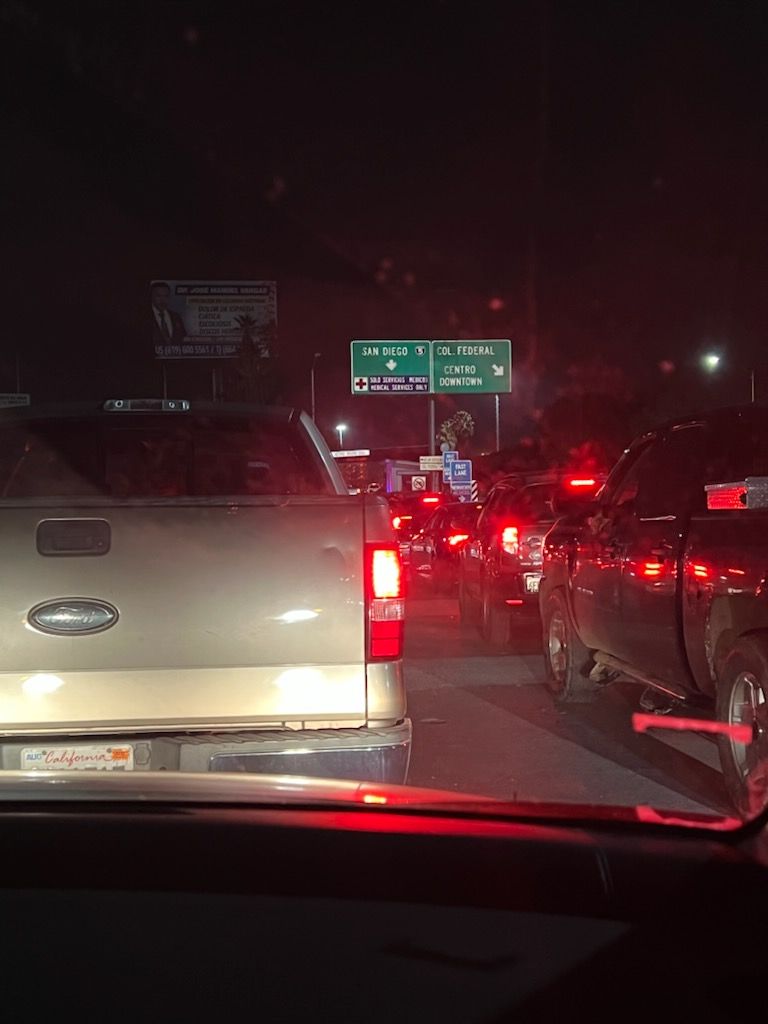Trapped

"How long have you been in line?" , I asked.
The reply on the phone,"We've been here for an hour and haven't moved."
"What! What's happening?"
The answer, "We don't know - there are police vehicles circling around but we don't know why - something is going on, but there's no way to know." They were in line at the "ready" entry lanes at the border. Things were far from ready to process long lines of vehicles trying to go north on a Thursday night.
"Well we are going to the other port of entry so we will call you again later." I replied.
Three hours later, the other vehicle moved 75 feet. Five hours later, they still had not entered the actual processing lane. Ten hours later at 2 a.m., finally, there was a crossing. In between, several calls and exchanges:
From them, "I need a bathroom."
From our vehicle, "The GPS is re-routing and the street is taped off with no explanation about why - we are driving in circles." (Never mind that we had already been driving in circles looking for a place near the sea to stop and have supper before heading home.)
From a third and fourth vehicle, "Yes, we are in the same situation. We don't know what is happening."
From all of us, "We're trapped."
This was the end of a day trip to the sanctuary where 1500 or so people are being sheltered as they make their way to the north. They too are trapped - for an indefinite amount of time because Title 42 has not been set aside. The federal law, adopted during the last administration, keeps asylum applicants south with no ability to seek exceptions or waivers to overcome that barrier. Sometimes, the numbers of families permitted entry open; other times, permission is restricted. There is recognition that Ukraine's refugees move more quickly through the shelter; and there is understanding as to why.
The delay seemed random - like the experience of this last trip. While the public discourse creates space for viewpoints on how governments should behave, the actual conditions that one encounters in places like the sanctuary offers a different kind of discourse. It is a human discourse, without the interest-based messaging, leadership positioning, or movement-building strategy - it is real life for people fleeing threats of violence, many of whom have already lost family members. The 600 or so children are a source of vibrancy and joy. And when a visitor brings anything - the smallest ones are ready to take something into the space in the church where donations are sorted. The outstretched hands need something - so toilet paper or bags of socks are given.
The boys, coming into their teen years take the 25 pound bags of rice, two at a time to help with the off-loading. The kitchen is constantly working - one being dedicated to make food for the workers who are building the retaining walls, the water gutters, the upstairs dining area in the new kitchen, the playing field for the children, and now... the garden that will grow peppers, tomatoes, cucumbers, and more. This is the discourse on the ground.
The idea of being "trapped" takes many forms. Here, one might think of the families at the shelter as trapped, but that is not the dominant energy at all. Rather, it is like anywhere else: people doing their best to contribute to what is needed to make life work; people with hopes to get somewhere but have encountered delays; people who do things not for money or recognition or to "win" a contest of one kind or another, but just because they have the ability to do the things needed. It is the men who know how to build structures, doors, and walls. It is the women who know how to take very little and turn it into meals for literally hundreds (several times a day!). It is the children who still play and laugh and are curious about the people who come to the shelter.
The pastor will go into deep meditation and prayer this month. He will fast for weeks and will wait for what may be needed in the next cycle.
For some of us, the 10 hour wait - turned into humor and opportunities to learn more about one another and to deepen relations. The wait was an object lesson in the old adage that urges one to see challenges as opportunities; bad events as the portal to good ones; and frustrations as the gateway to lessons in patience, invitations to meditate, offerings to increase one's ability to appreciate the meaning of privilege and humility.
Trapped? Hardly.
We were not uncertain about our passage and yet felt the momentary tension of facing the unknown - why the delay, why the blockages on the streets when maps said this was the way, why no alternatives being offered? We were just trying to get to a place we call "home.". The families we had left behind were several steps away from even locating a new place they could call "home.".
Trapped? Thinking about the myriad ways in which we find ourselves in that state - mentally, emotionally, spiritually, and physically - and realizing that the reality for us was far from truly being trapped, was a gift at the end/beginning of another year's going/coming.